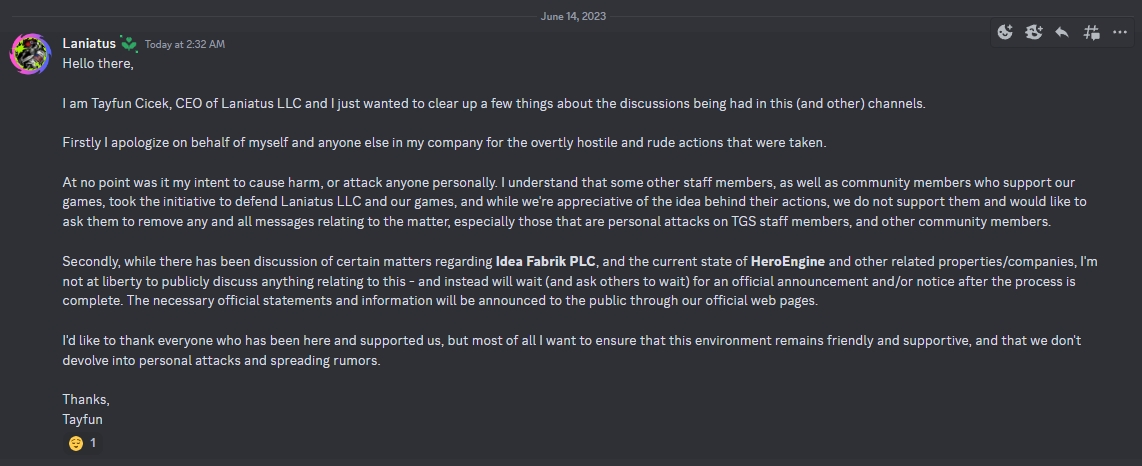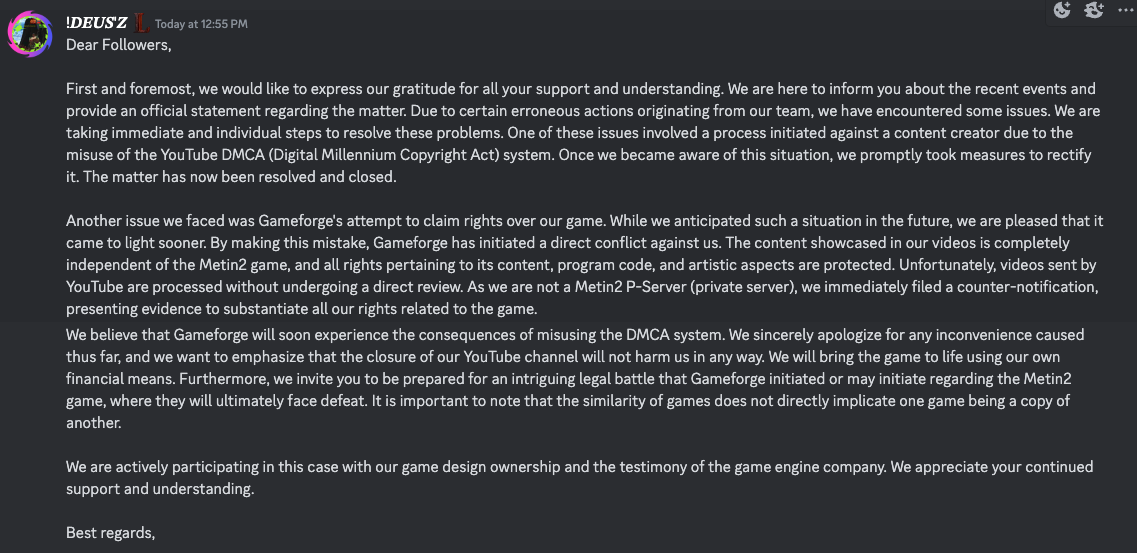The Magic to Master mess devolved into DMCA abuse as Laniatus promises launch ‘regardless of Kickstarter’ (original) (raw)

We’ve been trying real hard not to have to write about this game again, but here we are back touching base on the Magic to Master saga, the slow rolling trainwreck that keeps spewing flames into the sky.
Let’s recap first: This is a very old Korean MMO that was being revived by an Eastern European indie studio for a crowdfunding campaign and relaunch, which almost immediately went off the rails because the Kickstarter used fake testimonial reviews from multiple websites, including ours, to sing its praises. The reviews were removed with copious apologies when we pointed this out, though not before the company behind it all, Laniatus, blamed a “Nigerian Fiverr freelancer” for the Kickstarter issues and complained we had harmed its brand image when we amended but didn’t delete our article.
It got a lot weirder from there. Laniatus attempted to wave away its crypto ambitions by arguing that “NFT” stands for “necessary features tree”; the provenance of the game and the number of people working on it looked bizarrely out of scale with reality; the developers claimed a “budget of more than 10 million euros” while seeking just $26K on Kickstarter; and the relationship between Laniatus and HeroEngine company Idea Fabrik came in and out of focus as studio reps claimed ownership over that seemingly defunct studio too.
That revelation opened up a whole new side sluice of The Repopulation MMO drama as the presumed former Idea Fabrik boss and head of TGS Tech let loose in Discord with accusations about Idea Fabrik and Laniatus. (TGS had been contracted by Idea Fabrik to work on The Repopulation but quit at the end of 2022 over what it characterized as failed contract discussions; Idea Fabrik has never come clean with the public about the game and indeed appears to have let it die entirely.) IF and Laniatus reps then went on a tear accusing TGS of defamation and fraud, which as we pointed out should probably be adjudicated in court rather than in Discord if it were actually true.
So what ought to have happened next was the Kickstarter quietly failed and everyone forgot it ever happened and maybe it showed back up at the end of the year in my Make My MMO list before slinking off forever. But instead, YouTube got wind of the drama – specifically, YouTuber Callum Upton, who’s apparently made a solid career of calling out crappy crypto games.
Upton published a video – “$10k for a sword?! wild kickstarter mmo scam?” – applying his efforts to scrutinize Magic to Master, walking through the Kickstarter, finding the same problems we did, and spending the bulk of the video criticizing the engine, the antique appearance of the game, the truly bizarre funding structure, the huge number of people supposedly working on the game, and the incredible stretch goals. (By the time he filmed, Laniatus had deleted the fake reviews, so he didn’t have those to talk about; he also doesn’t catch the NFT reference, which would’ve been right up his alley to mock!)
In any case, we’ve listened to the entire video, and it’s not a great look for Laniatus and Magic to Master, but it’s pretty tame given what the game deserves, and it’s nothing other gamers hadn’t already pointed out.
Nevertheless, Laniatus (or somebody associated with Laniatus, like one of the many confused trolls/sockpuppets in Idea Fabrik’s Discord [Update: It’s now being blamed on an unnamed Laniatus staffer – see end of article]) apparently decided to go full Streisand effect and abuse copyright law to compel YouTube to take down the video with a DMCA claim. (Filing a false DMCA claim, we note, is illegal in the US, but it’s a favorite tool of game devs in certain countries to attack critics.) Upton then uploaded the video to Twitter, accusing Laniatus of fake copyright striking.
But no need to doubt him; Laniatus (or, again, somebody associated with the company) wrote the whole ordeal up on IndieDB, claiming (falsely) that Upton had defamed Laniatus and “made serious accusations against Laniatus” in an “[attempt] to spread falsehoods and undermine game development.” The post brags that Laniatus petitioned YouTube to remove the article, “bringing the truth to light” and ensuring that “justice has been served.” It also claims that Laniatus is taking legal action against Upton, which we’re extremely confident Upton has nothing to worry about, given that these folks also threatened legal action against TGS Tech that has thus far come to nothing. Here’s the whole admission, in case it disappears later:

So… how is that Kickstarter doing, exactly? With 14 days to go and 33 backers, it’s made 50% of its 26Kask,whichfranklyis26K ask, which frankly is 26Kask,whichfranklyis13K too much. But it turns out that it doesn’t really matter since the game is apparently happening anyway and didn’t really need that $26K. “Our game will be released, regardless of Kickstarter campaign’s outcome,” the company tweeted early yesterday morning. “We take honesty seriously, launching an investigation into those spreading false information.”
This morning, Laniatus’ Tayfun Cicek also posted a vague Discord apology that appears to be trying to disavow knowledge of and involvement with the ongoing drama, though it doesn’t specifically mention the DMCA takedown or the IndieDB article. “I understand that some other staff members, as well as community members who support our games, took the initiative to defend Laniatus LLC and our games, and while we’re appreciative of the idea behind their actions, we do not support them and would like to ask them to remove any and all messages relating to the matter, especially those that are personal attacks on TGS staff members, and other community members,” Cicek writes.

Just to note, the user comment 11 ticks above this Discord apology includes attacks on MOP and myself personally merely for reporting on what’s going on with this story that we broke only because a studio was misrepresenting our support for its own profit, so you can see exactly what this apology is worth. Also, we do have to point out that Cicek has swapped his Discord account from hero.root to Laniatus, wiping many of his own recent comments and claims as hero.root – and reminding us why we clip Discord convos even when it’s tacky.
Closing out here: Callum Upton’s rebuttal to the DMCA takedown was apparently upheld, and his video is back on YouTube as we type this. Not coincidentally, he’s promised a follow-up, which ought to be fun, especially since he’ll have more details about the nature of the copyright strike and who was actually behind it.
Recapping the whole saga:
Update 2p EDT
This afternoon in the M2M Discord, Laniatus admits that the DMCA takedown was one of several “erroneous actions originating from [its] team.”
“One of these issues involved a process initiated against a content creator due to the misue of the YouTube DMCA (Digital Millennium Copyright Act) system,” Cicek says. “Once we became aware of this situation, we promptly took measures to rectify it. The matter has now been resolved and closed.” (We note here that this is the same thing Laniatus tried with us, but you can’t unilaterally declare your so-called errors “resolved and closed.” The victims of illegal DMCA takedowns and fake review claims get to decide whether the issue is resolved and closed.)
Apparently, there’s more to it, though, as Laniatus suggests Gameforge is now pursuing it by issuing DMCA takedowns on Magic to Master videos under the belief that the game is actually just Metin2. It also looks as if YouTube took down Magic to Master’s whole channel. “We invite you you be prepared for an intriguing legal battle that Gameforge initiated or may initiate regarding the Metin2 game, where they will ultimately face defeat,” Laniatus says, adding that “the similarity of games does not directly implicate one game being a copy of another,” which demonstrates a bit of a misunderstanding about how copyright works. Either way, stock up on popcorn.

Update 8a EDT 6/15
Gameforge apparently DMCA’d the Kickstarter. More here.